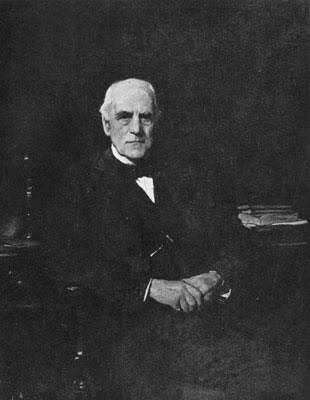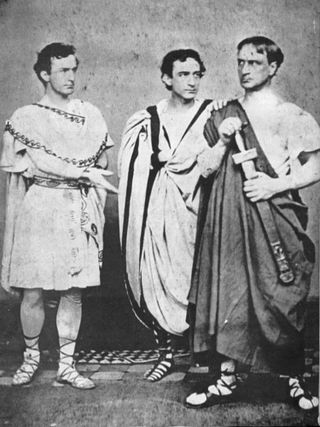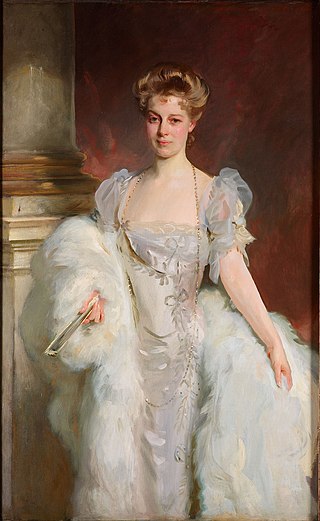Other uses
- Junius (band), an American rock band
- Junius (horse)
Junius often refers to:
Junius may also refer to:

John Wilkes Booth was an American stage actor who assassinated United States President Abraham Lincoln at Ford's Theatre in Washington, D.C., on April 14, 1865. A member of the prominent 19th-century Booth theatrical family from Maryland, he was a noted actor who was also a Confederate sympathizer; denouncing President Lincoln, he lamented the then-recent abolition of slavery in the United States.

John Pierpont Morgan was an American financier and investment banker who dominated corporate finance on Wall Street throughout the Gilded Age and Progressive Era. As the head of the banking firm that ultimately became known as J.P. Morgan and Co., he was a driving force behind the wave of industrial consolidations in the United States at the turn of the twentieth century.
Sic semper tyrannis is a Latin phrase meaning "thus always to tyrants". In contemporary parlance, it means tyrannical leaders will inevitably be overthrown. The phrase also suggests that bad but justified outcomes should, or eventually will, befall tyrants. It is the state motto of Virginia.

Junius Spencer Morgan I was an American banker and financier, as well as the father of John Pierpont "J.P." Morgan and patriarch to the Morgan banking house.

Anthony Joseph Drexel Sr. was an American banker who played a major role in the rise of modern global finance after the American Civil War. As the dominant partner of Drexel & Co. of Philadelphia, he founded Drexel, Morgan & Co, which later became J.P. Morgan & Co., in New York City in 1871 with J. P. Morgan as his junior partner. He also founded Drexel University in Philadelphia in 1891.

Green Mount Cemetery is a historic rural cemetery in Baltimore, Maryland, United States. Established on March 15, 1838, and dedicated on July 13, 1839, it is noted for the large number of historical figures interred in its grounds as well as many prominent Baltimore-area families. It retained the name Green Mount when the land was purchased from the heirs of Baltimore merchant Robert Oliver. Green Mount is a treasury of precious works of art, including striking works by major sculptors including William H. Rinehart and Hans Schuler.
J.P. Morgan & Co. is an American financial institution specialized in investment banking, asset management and private banking founded by financier J. P. Morgan in 1871. Through a series of mergers and acquisitions, the company is now a subsidiary of JPMorgan Chase, one of the largest banking institutions in the world. The company has been historically referred to as the "House of Morgan" or simply Morgan.

John Pierpont Morgan Jr. was an American banker, and finance executive. He inherited the family fortune and took over the business interests including J.P. Morgan & Co. after his father J. P. Morgan died in 1913.
The Clays were an influential nineteenth-century U.S. political and business dynasty. The Clays are of English stock, and there are quite a few Clay families still in England, and also in other parts of the world.

The Booth family was an English American theatrical family of the 19th century. Its most known members were brothers Edwin Booth, one of the leading actors of his day, and John Wilkes Booth, also a fellow actor most remembered for assassinating Abraham Lincoln.

Henry Sturgis Morgan Sr. was an English born American banker, known for being the co-founder of Morgan Stanley and the president and chairman of the Morgan Library & Museum.

The first theatre in New York City to bear the name The Winter Garden Theatre had a brief but important seventeen-year history as one of New York's premier showcases for a wide range of theatrical fare, from variety shows to extravagant productions of the works of Shakespeare. Initially known as Tripler's Hall or Metropolitan Hall, it burned down in 1854 and was rebuilt as The New York Theatre. It rose from the ashes under different managers, bearing various names, to become known as one of the most important theatres in New York history. It nearly burned again in November 1864, in plot hatched by Confederate sympathsizers, and burned to the ground a second time in 1867.
J. S. Morgan & Co. was a merchant banking firm based in London and New York City founded by Junius Spencer Morgan, father of J. P. Morgan.
Junius Spencer Morgan (1813–1890), was an American banker and financier, father of J. P. Morgan

Junius Spencer Morgan II was a banker, art collector and nephew of John Pierpont Morgan, Sr.

Junius Spencer Morgan III was an American banker and a director of the Morgan Guaranty Trust Company.

The Morgan family is an American family and banking dynasty, which became prominent in the U.S. and throughout the world in the late 19th century and early 20th century. Members of the family amassed an immense fortune over the generations, primarily through the work of Junius Spencer (J.S.) Morgan (1813–1890) and John Pierpont Morgan Sr. (1837–1913).
William George Cavendish-Bentinck, was a member of parliament for Penryn and Falmouth between 1886 and 1895, who married into the American Livingston family.
Elizabeth Cavendish-Bentinck was an American born member of the Livingston family who married a British Member of Parliament from the Cavendish-Bentinck family and was a prominent member of New York Society during the Gilded Age.

Jane Norton Grew, known upon her marriage as Mrs. J. P. Morgan Jr., was an American socialite, art collector, and dilettante horticulturalist. Born in Boston to an affluent family, she married J. P. Morgan Jr., son of American financier J. P. Morgan, in 1890 and became prominent in both London and New York society, playing host to royalty including The Duke of Connaught and Strathearn. Grew curated and managed the Morgan library and art collection, and became involved in horticulture on her Long Island estate in Glen Cove.